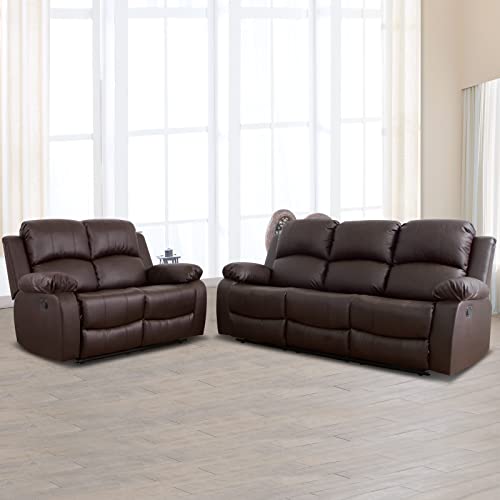Incontestable Evidence That You Need Genuine Leather Sofa
페이지 정보
작성자 Charmain 작성일 24-12-10 01:50 조회 9 댓글 0본문
 How to Spot a Genuine Leather Sofa
How to Spot a Genuine Leather SofaWith its soft leather upholstery this sofa looks fantastic in any room. People love its simple design and the premium quality genuine leather upholstery.
Untrained eyes may be unable to in discerning the difference between real and faux leather. Here are six useful tips to help you tell the difference: 1. The rough edges.
1. Labels are crucial
Genuine leather is difficult to duplicate. It has a distinctive feel and look. It's also robust and easy to clean. It doesn't absorb excess body oils, making it ideal for those with allergies. However not all leather sofas are made to be the same. Some retailers have even been known for passing off PVC as genuine leather.
To avoid being scammed, it's crucial to be aware of the various kinds of leather. This includes determining the difference between top and full grain leather, as well as assessing the quality of the upholstery material. Do not be afraid to ask your favorite retailers for this information.
To determine if you've got a genuine leather sofa you should first look at the label. It should clearly state what kind of leather the sofa is covered in, as well as any other materials like cotton or fabric. Additionally, reliable sellers will have clear policies regarding returning or exchanging items in the event you aren't happy with your purchase.
If the sofa doesn't have a label, you can still verify its authenticity by examining the fabric backing of the sofa or opening the cushion casing. You can also examine the texture of the leather and see whether it's got any imperfections or bumps, since these are indicators that you're dealing with fake or leather that has been bonded.
You can also test the sofa's integrity by touching its surface. Genuine leather has a smooth, soft texture. Faux leather couch with chaise or bonded leather is rougher and feels more like suede. You should also be in a position to feel the difference between wrinkles, bumps and printed patterns of faux leather and genuine leather corner lounge (zenwriting.Net).
A genuine leather sofa is more expensive than its faux counterpart but it will last longer. It could become an important family heirloom with time. Place your leather sofa in an airy cool and cool room, far from fireplaces, heaters, and air conditioning units. This will reduce the damage caused by heat, humidity and Ozone. You can also use leather protection creams to keep your sofa in good shape and sturdy.
2. Look at the back
If the label doesn't inform you what kind of reupholster leather couch sofa is, it's essential to get up-close and close to it. The smell, feel, and back will all be unmistakable indicators of authenticity.
Genuine leather may not feel smooth when you contact it. This is due to the fact that animal hides have diversely shaped pores that allow it to breathe. However, a product that is smooth and soft suggests that it may be fake leather.
Check for bumps or uneven surfaces. The process of preparing genuine leather includes buffing, which takes away some of the rough outer skin. If the material that covers your sofa is top grain leather, there'll still be some bumps.
You can also test the leather by pressing your finger into it and then running it across it. If the leather is genuine, it will stretch and wrinkle just like human skin. This means that it's capable of breathing, which means that the material doesn't become dry and crack with time.
Faux leather is printed and has a consistent pattern, while genuine leather will have natural imperfections that add to its beauty and durability. This includes creases, scratches and marks. A good genuine leather sofa will be supple and slightly stiff when new, but it should not crack or dry out over time if regularly maintained with a specific leather protection cream.
To cut costs, some furniture manufacturers use a combination of synthetic and real leather and fabric sofa to create their furniture. The areas that are 'contact like seats and armrests, as well as backs, are made from real leather, while the non-contact areas like the base and outside arms, are upholstered using a less expensive synthetic fabric made of polyurethane or leather. Even if a couch is advertised as genuine leather, you should examine the back to determine if it is genuine leather.
Labels and pricing can help you identify a genuine leather sofa, but it is important to inspect it up close. Feel it, smell it, and then check its back for a polyurethane backing, which is a clear indication that it's not genuine leather.
3. Take a look at the seat
A genuine leather sofa's seat is a good indicator of quality. Genuine leather is distinct from faux leather, which uses the same materials. It has a unique texture and feels smooth when you touch it. Be aware of bumps under the surface, and a strong natural, fresh scent. These characteristics differentiate real leather from imitations or cheap leather couches for sale near me.
Another sign of a bad sofa is when the tufted leather couch is stitched together in a continuous, large piece. While this is not uncommon with faux leather, if you notice this with real top-grain leather it's likely to be a sign that the sofa is not of good quality and should be avoided.
The label and price may give you an idea but the only certain way to know is to touch the furniture. Real leather is not perfect, and it should feel rough to the touch. It also has large wrinkles in the surface and rough edges. Genuine leather is soft and different than synthetic materials. The temperature of the furniture can be a sign of whether it is made from authentic materials.
A leather sofa is a staple of interior design for good reason: It's elegant, durable and long-lasting. It's also easy to clean and resistant to liquid spills. This makes it a perfect choice for families who have pets or children. The best thing about genuine leather it's that it's a classic style that won't go out of style, and it's still available in a variety of price points.
If you're looking for a classic leather sofa that can last for a long time, look into the Pottery Barn Turner. The two-seater is quite expensive, but it is made of top-quality leather that can last for a long time. It's a great choice for those who have small spaces, too, as it's available in three sizes and is small enough to fit in the majority of rooms.
This All Modern Geo Genuine Leather sofa is a great choice to consider if you're looking for something contemporary. This couch is a mid-century modern-inspired style with an elegant, angular frame and asymmetrical pillows that combine functionality and form. While the frame is crafted from plywood, composite and plastic, this sofa features genuine leather only in the seating area which is a step up from Ikea's faux-leather couch, which was awarded the CHOICE's "Shonky" award in 2015.
4. Check out the smell
Real leather has a distinctive smell. It's a natural, organic scent that can't be replicated. If the sofa you're trying to purchase has a strong smell of synthetic it's a sign that it's not genuine. It is usually due to the chemicals used to process the leather. They remain in the furniture after it's been manufactured and even after you take it home.
A good way to test the quality of a leather sofa is to run your fingers along the surface. Genuine leather will feel rough and include lumps and bumps, just like human skin. If it feels soft and cold, it is most likely fake or bonded leather.
You can also open one of the cushions to inspect the back. The faux and bonded hides have a polyurethane back to provide support for the manufactured upholstery. Genuine leather has an untreated back like coarse suede. If the sofa has a woven backing it is not real leather.
Peter says that the best way to determine if a sofa is real is to gently run your fingernails over the surface. The grit on the leather will make your fingernails duller, and the surface should be stretched and wrinkled slightly. It should also feel soft and warm to the touch.
Another way to tell whether a sofa is genuine is to turn it over on its side and look at the back of the upholstery. Faux and bonded leather will have a plastic coating on the back of the sofa while genuine leather is a single, continuous piece of leather that covers the entire back of the sofa.
Think about how often you'll use your leather sofa and how long it is expected to last before deciding on the best. The more you utilize a couch in a given time, the more it will require to be taken care of. Peter suggests regular and gentle cleaning using an exclusive leather conditioner to maintain the suppleness of the leather and keep it from becoming hard and dry.

- 이전글 Low Gold Price - Dead Or Alive?
- 다음글 10 Things Everyone Hates About Land Rover Key Replacement Cost Uk
댓글목록 0
등록된 댓글이 없습니다.
